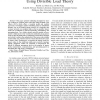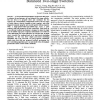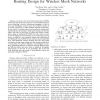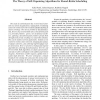1132 search results - page 139 / 227 » On coordination, autonomy and time |
GLOBECOM
2007
IEEE
14 years 4 months ago
2007
IEEE
Abstract— This paper presents scheduling strategies for sensing workload in wireless sensor networks using Divisible Load Theory (DLT), which offers a tractable model and realist...
ICC
2007
IEEE
14 years 4 months ago
2007
IEEE
— We consider opportunistic spectrum access (OSA) which allows secondary users to identify and exploit instantaneous spectrum opportunities resulting from the bursty traffic of ...
ICC
2007
IEEE
14 years 4 months ago
2007
IEEE
— A novel feedback mechanism is proposed in this paper to enhance the performance of load-balanced two-stage switches. The key idea is to properly select and coordinate the two s...
INFOCOM
2007
IEEE
14 years 4 months ago
2007
IEEE
— In recent years, the wireless mesh network (WMN) attracts the interest of many people as a new broadband Internet access technology. However, increasing throughput is still an ...
SASO
2007
IEEE
14 years 4 months ago
2007
IEEE
The study of synchronization has received much attention in a variety of applications, ranging from coordinating sensors in wireless networks to models of fireflies flashing in...




